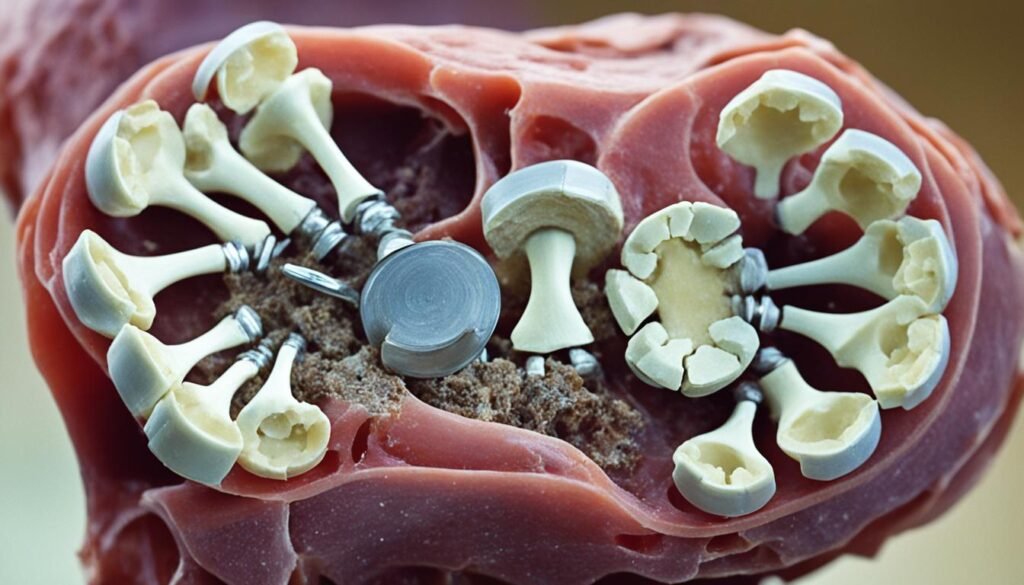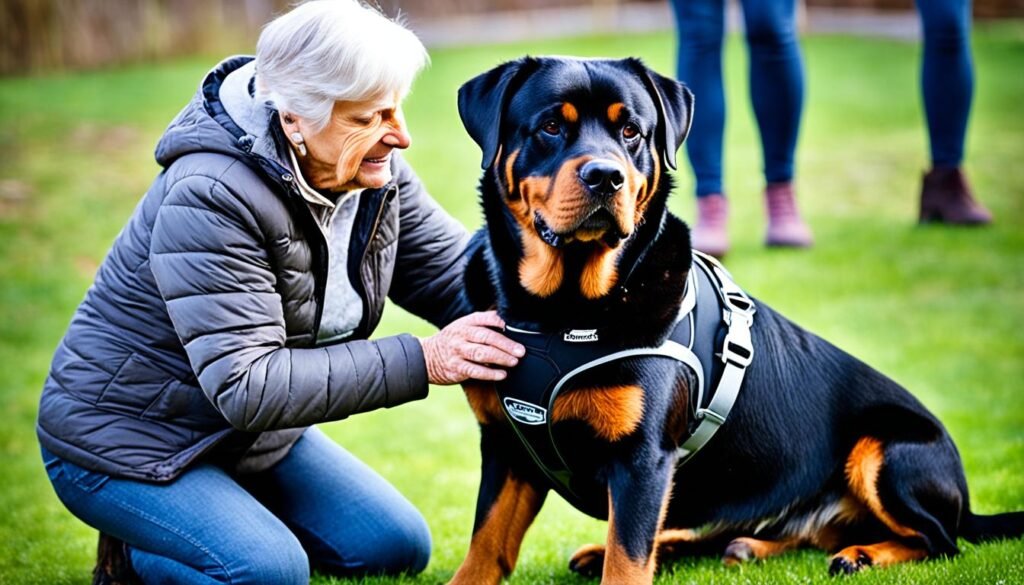As our beloved Rottweilers enter their golden years, it’s important to be aware of the common health issues they may face. While Rottweilers, like any other dog breed, can live healthy lives, they are susceptible to certain age-related health concerns. By understanding these potential issues and taking preventive measures, we can ensure the well-being and longevity of our senior Rottweilers.
Senior Rottweilers may experience various health conditions as they age. These include progressive retinal atrophy, cataracts, aortic stenosis, hip dysplasia, elbow dysplasia, osteochondritis dissecans, cancer, and allergies. By staying informed about these health issues, we can provide the necessary care and attention to keep our furry friends happy and healthy throughout their senior years.
Key Takeaways:
- Senior Rottweilers are prone to common health issues like progressive retinal atrophy, cataracts, aortic stenosis, and joint disorders.
- Regular check-ups with a veterinarian and early detection of health concerns are crucial for maintaining the well-being of senior Rottweilers.
- Managing senior Rottweilers’ health includes preventative measures, such as proper nutrition, exercise, and regular grooming.
- Understanding the signs and symptoms of various health conditions can help identify and address potential issues in senior Rottweilers.
- By providing love, care, and attention, we can ensure that our senior Rottweilers enjoy a happy and healthy life.
Progressive Retinal Atrophy (PRA) in Senior Rottweilers
Progressive Retinal Atrophy (PRA) is a common eye disorder that can affect Rottweilers, particularly in their senior years. PRA is a degenerative condition that gradually impairs the photoreceptors in the back of the eye, leading to night blindness and eventual loss of daylight vision.
As Rottweilers age, it is important for owners to be vigilant about their eye health. Symptoms of PRA may include difficulty navigating in low light, bumping into objects, or a noticeable decline in the dog’s visual acuity. Regular check-ups with a veterinarian are crucial for early detection of PRA in senior Rottweilers.
While there is no cure for PRA, being aware of the condition allows owners to make the necessary adaptations to support their Rottweiler’s visual impairment. Simple changes to the environment, such as rearranging furniture or using nightlights, can help the dog navigate more easily even with limited vision.
Additionally, providing mental stimulation through other senses, such as using scent-based toys or engaging in interactive play, can help compensate for the loss of visual stimuli. It is also important to maintain a consistent routine and avoid sudden changes to the dog’s environment as it may cause additional stress.
Overall, managing PRA in senior Rottweilers requires a caring and understanding approach. By working closely with a veterinarian, owners can ensure their furry companions continue to lead fulfilling lives despite vision impairment.
Cataracts in Senior Rottweilers

Cataracts are a common eye-related condition that can affect senior Rottweilers. They occur when there is clouding of the lens of the eye, leading to vision impairment. Cataracts in Rottweilers can range in severity, from mild opacity to complete loss of vision, necessitating corrective surgery. While cataracts can be a significant concern, there are effective methods to treat them, including cataract surgery.
Regular eye examinations are crucial in monitoring the development of cataracts in senior Rottweilers. By detecting cataracts early, appropriate interventions can be implemented to manage the condition effectively. Proactive management of cataracts may involve lifestyle adjustments, dietary modifications, and medication, depending on the specific situation.
Cataract surgery, a common treatment option, involves removing the cloudy lens and replacing it with an artificial one. This procedure aims to restore vision and enhance the overall quality of life for senior Rottweilers. Consulting with a qualified veterinary ophthalmologist is essential to determine if cataract surgery is suitable for your dog.
It is vital to note that not all cataracts will require immediate surgery. Your veterinarian will help assess the severity and progression of the cataracts and recommend the best course of action accordingly.
To promote the overall eye health of senior Rottweilers and reduce the risk of cataracts, it is important to provide a balanced diet, maintain a healthy weight, and protect their eyes from harmful UV radiation. Additionally, regular exercise and mental stimulation can contribute to their overall well-being.
Stay vigilant and proactive in managing your senior Rottweiler’s eye health to ensure a happy and fulfilling life for your beloved companion.
Aortic Stenosis in Senior Rottweilers

Aortic stenosis is a serious cardiovascular condition that can affect the cardiac health of senior Rottweilers. It occurs when there is a partial obstruction in the flow of blood from the left ventricle to the aorta, the main artery of the body. This partial obstruction puts extra strain on the heart, leading to various symptoms and potential complications.
One of the primary signs of aortic stenosis in senior Rottweilers is the presence of a heart murmur, which is an abnormal sound heard during a veterinarian’s examination. It is crucial to detect heart murmurs early as they can indicate the presence of cardiovascular disease and guide the necessary interventions.
To diagnose aortic stenosis and assess its severity, veterinarians may perform additional tests such as an electrocardiogram (EKG), chest X-rays, and Doppler echocardiography. These tests help identify any abnormal rhythm in the heart, evaluate the precise location and extent of the obstruction, and determine the overall cardiac health of senior Rottweilers.
Cardiac screenings and early detection play a vital role in ensuring appropriate management and care for senior Rottweilers affected by aortic stenosis. Regular check-ups with a veterinarian familiar with Rottweiler cardiac health can help monitor the progression of the condition and determine the best course of action to maintain the dog’s quality of life.
It is important for owners of senior Rottweilers to be proactive in managing their pet’s cardiac health. This may include maintaining a healthy weight, providing regular exercise, and ensuring a balanced diet. Additionally, certain medications and lifestyle adjustments may be recommended by a veterinarian to help manage the symptoms associated with aortic stenosis and reduce the risk of complications.
Joint Disorders in Senior Rottweilers: Hip and Elbow Dysplasia

As Rottweilers age, they are prone to joint disorders that can significantly impact their quality of life. Two common joint conditions in senior Rottweilers are hip dysplasia and elbow dysplasia. These disorders can cause pain, lameness, and mobility issues, affecting their overall well-being.
Hip dysplasia occurs when there is a displacement between the hip joint and the thighbone, leading to joint instability. This condition is known to cause joint pain and can progress to arthritis if left untreated. Elbow dysplasia, on the other hand, involves a displacement between the elbow joint and the bone, resulting in similar symptoms.
- Screening for Early Detection: It is crucial to screen Rottweilers for hip and elbow dysplasia early in their lives. Recognizing the signs and symptoms of these joint disorders can help manage and treat them effectively. Regular veterinary check-ups and diagnostic tests such as X-rays and physical examinations can aid in early detection.
- Managing Joint Disorders: Once diagnosed, joint disorders in senior Rottweilers can be managed through various treatments. Medication, including pain relievers and anti-inflammatory drugs, can help alleviate symptoms and improve mobility.
- Surgical Intervention: In severe cases, surgery may be necessary to correct the joint abnormalities. Procedures such as total hip replacement or arthroscopy can provide relief and restore joint function.
Additionally, lifestyle modifications can play a vital role in minimizing the effects of hip and elbow dysplasia. Regular exercise tailored to their condition, weight management, and controlled breeding practices can help reduce the risk and severity of joint disorders in senior Rottweilers.
Understanding and addressing joint disorders in senior Rottweilers, such as hip dysplasia and elbow dysplasia, is essential for maintaining their overall well-being. By taking proactive measures and providing appropriate care, you can help your furry companion continue to enjoy an active and pain-free life.
Cancer in Senior Rottweilers

Cancer is a prevalent health concern in senior Rottweilers, and it can have a significant impact on their overall well-being. Lymphoma is the most common type of cancer seen in Rottweilers, affecting their lymphatic system. However, other forms of cancer, such as bone cancer, liver cancer, and spleen cancer, can also occur in senior Rottweilers. The exact causes of cancer in dogs are still unknown, but certain risk factors, such as genetic predisposition and exposure to environmental toxins, may contribute to its development.
Early detection and diagnosis play a crucial role in improving the prognosis and treatment outcomes for senior Rottweilers with cancer. Routine check-ups and vigilant monitoring for symptoms are essential for identifying any potential signs of cancer. These symptoms may include unexplained weight loss, decreased appetite, lethargy, abnormal lumps or swelling, difficulty breathing, and changes in bathroom habits.
If cancer is suspected, your veterinarian may recommend a series of diagnostic tests, such as blood tests, imaging scans, and biopsies, to determine the type and extent of the disease. Once a diagnosis is confirmed, a tailored treatment plan can be developed for your senior Rottweiler.
Canine tumor treatment options vary depending on the type and stage of cancer. Surgery is often recommended as the first line of treatment for localized tumors that can be surgically removed. In cases where surgery is not feasible or the cancer has spread, radiation therapy or chemotherapy may be recommended to target cancer cells and slow their growth.
It is crucial to provide your senior Rottweiler with regular veterinary care to monitor their overall health and detect any signs of cancer at an early stage. Additionally, preventive measures, such as vaccinations and avoiding known carcinogens, can help reduce the risk of cancer development in your furry companion.
Conclusion
As a responsible owner, I understand the importance of senior Rottweiler health care and managing their health issues. By prioritizing preventive care and regular veterinary check-ups, I can ensure the well-being of my aging Rottweiler. Being aware of common health concerns like progressive retinal atrophy, cataracts, aortic stenosis, joint disorders, and cancer empowers me to take proactive steps in maintaining their optimal health.
One of the key aging Rottweiler tips is providing them with proper nutrition, exercise, and a loving environment. It’s crucial to provide a balanced diet that meets their specific nutritional needs as they age. Regular exercise helps keep their joints agile and maintains their overall physical fitness. Lastly, showering them with love, attention, and mental stimulation contributes to their happiness and overall well-being as they navigate their senior years.
By implementing these senior Rottweiler health care practices and staying proactive in managing their health issues, I can ensure my beloved companion enjoys their golden years to the fullest. Watching them stay healthy and happy brings me immense joy and fulfillment as a pet owner.
FAQ
What are the common health issues in senior Rottweilers?
Common health issues in senior Rottweilers include progressive retinal atrophy, cataracts, aortic stenosis, hip dysplasia, elbow dysplasia, osteochondritis dissecans, cancer, and allergies.
What is Progressive Retinal Atrophy (PRA) in senior Rottweilers?
Progressive Retinal Atrophy (PRA) is a degenerative eye disorder that gradually impairs the photoreceptors in the back of the eye, leading to night blindness and eventual loss of daylight vision.
How can cataracts affect senior Rottweilers?
Cataracts are an eye-related condition in senior Rottweilers that cause opacity within the lens of the eye, leading to vision impairment. The severity of cataracts can range from mild to severe, with the latter requiring corrective surgery.
What is Aortic Stenosis in senior Rottweilers?
Aortic Stenosis is a cardiovascular condition that occurs when there is a partial obstruction in the flow of blood from the left ventricle to the aorta, putting extra strain on the heart and potentially leading to heart attacks if left untreated.
What are the joint disorders that senior Rottweilers may develop?
Senior Rottweilers are prone to hip dysplasia and elbow dysplasia, which are joint disorders causing pain, lameness, and mobility issues. Regular screening, exercise, weight management, and selective breeding can help reduce the risk of these conditions.
How common is cancer in senior Rottweilers?
Cancer is a prevalent health concern in senior Rottweilers, with lymphoma being the most common type. Regular check-ups and vigilant monitoring for symptoms can lead to early detection and improve the prognosis. Treatment options for canine tumors include surgery, radiation therapy, and chemotherapy.
What is the importance of regular veterinary check-ups for senior Rottweilers?
Regular veterinary check-ups are crucial for senior Rottweilers to ensure early detection of any health concerns. Preventive care measures, including vaccinations and routine examinations, can play a vital role in managing and preventing health issues in aging Rottweilers.
How can I ensure the well-being of my senior Rottweiler?
To ensure the well-being of your senior Rottweiler, it is important to prioritize their health. This includes regular veterinary check-ups, preventive measures, early detection of health concerns, proper nutrition, exercise, weight management, and providing a loving environment.
